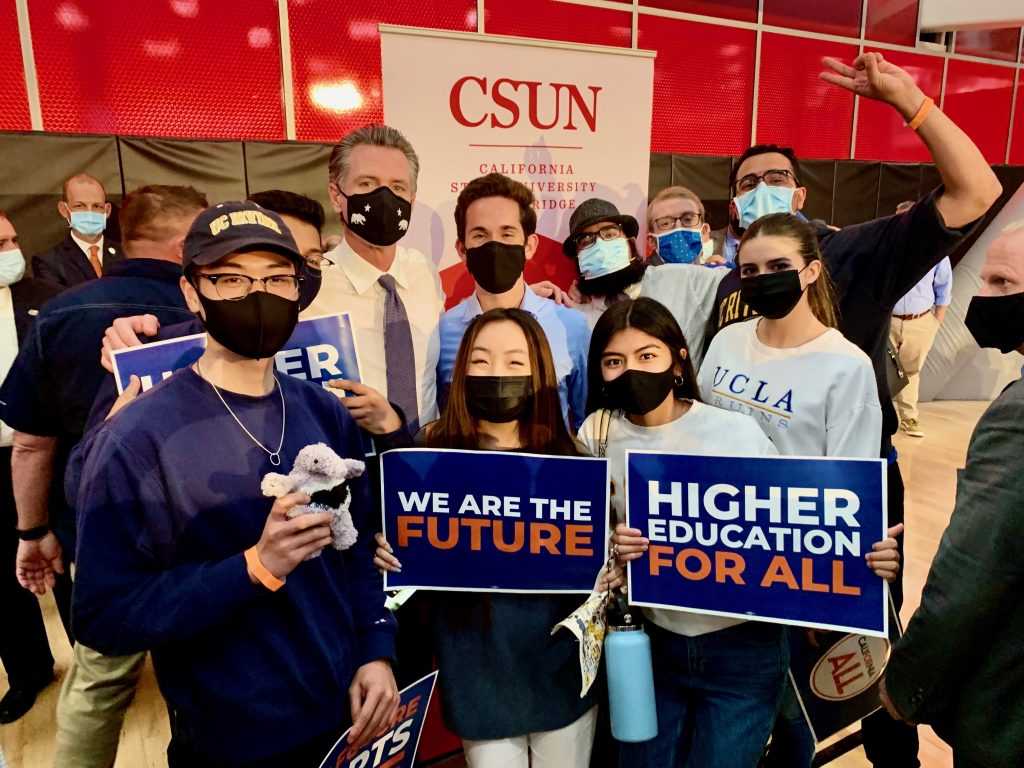AB 928 and AB 1111 make it easier for students to transfer into four year universities
AB 1377 and SB 330 improve housing affordability for students, complementing the California Comeback Plan’s unprecedented $2 billion investment in student housing
October 7, 2021 - NORTHRIDGE – At California State University, Northridge on Wednesday, Governor Gavin Newsom signed legislation to improve college affordability and increase access to higher education, and highlighted the historic $47.1 billion higher education package – the most ever invested in higher education in modern history.
“We’re turning commitments into reality by ensuring that our students have more access to high-quality educational opportunities, creating a change of course for generations to come and bolstering California’s innovation economy,” said Governor Newsom. “Californians have thrived at our world class universities for decades, but not everyone has had similar access – today that’s changing. Everyone deserves a shot at the ‘California Dream’ – we’re eliminating equity gaps and increasing opportunities at our universities to make those dreams a reality for more California students.”


Governor Newsom signed legislation at CSU Northridge to improve college affordability and increase access to higher education.
“Over the last five years I’ve held hearings across California to discuss higher education issues,” said Assemblymember Marc Berman, Chair of the Assembly Select Committee on the Master Plan for Higher Education in California. “When students discussed their experience with the transfer process from community college to four-year university their message was loud and clear: transfer is too complex, confusing, and difficult to navigate. Instead of being a clear path, it’s a maze, and it’s costing students time and money that they can’t afford. Together, Assembly Bills 928 and 1111 will make it easier for students to achieve their educational goals. I am grateful that Governor Newsom signed these historic bills, and for the advocates and students who inspired these reforms.”
“From historic investments in financial aid and student housing that will benefit students to a radical revamping of transfer, 2021 is a landmark year for public higher education in California,” said California State University Chancellor Joseph I. Castro. “We appreciate the bold vision demonstrated by Governor Newsom and his commitment to further improving education access and outcomes throughout the Golden State.”
Increasing Transfer Rates for Underserved Students
Governor Newsom today signed legislation to help facilitate access to the University of California (UC) and California State University (CSU) systems for students to attain four-year degrees and help further prepare them for the economy of tomorrow:
- AB 928 by Assemblymember Marc Berman (D-Menlo Park) – Requires the CSU and UC to jointly establish a singular lower division general education pathway for transfer admission into both segments. Also requires California Community Colleges (CCC) to place students who declare a goal of transfer on an Associate Degree for Transfer (ADT) pathway for their intended major, and establishes the ADT intersegmental implementation committee as the primary oversight entity.
- AB 1111 by Assemblymember Marc Berman (D-Menlo Park) – Requires, by July 1, 2024, the CCCs adopt a common course numbering system (C-ID) at all community colleges and for each community college campus catalog. This common course numbering system is required to be student-facing and ensures that comparable courses across all community colleges have the same course number.
Finding Solutions to the Student Housing Crisis
On top of the unprecedented $2 billion investment to significantly increase affordable housing for students and help address the student housing crisis, Governor Newsom signed legislation to create long-overdue housing plans at the UC and CSU systems:
- AB 1377 by Assemblymember Kevin McCarty (D-Sacramento) – Requires the CSU system, and requests the UC system, to conduct a student housing needs assessment for each campus, and create a student housing plan outlining how projected student housing needs will be met.
- SB 330 by Senator María Elena Durazo (D-Los Angeles) – Requires the Los Angeles Community College District (LACCD) to develop a pilot program to provide affordable housing to students or employees of LACCD. This bill also allows LACCD to enter into agreements with nonprofit or private entities to lease real property under certain conditions, in order to develop affordable housing.
Making Financial Aid More Accessible
Governor Newsom’s California Comeback Plan requires all students to submit a Free Application for Federal Aid (FAFSA) or California Dream Act application in order to significantly increase federal aid opportunities for California students, and today he signed legislation to further expand such supports:
- AB 340 by Assemblymember Chris Ward (D-San Diego) – Conforms the state’s 529 college savings plan statute to recent changes in federal tax law, expanding allowable withdrawals from 529 plans to include expenses associated with participation in a registered apprenticeship program and student loan repayment.
- AB 469 by Assemblymember Eloise Gómez Reyes (D-San Bernardino) – Requires, on or before September 1, 2022, and each year thereafter, the California Student Aid Commission and the California Department of Education to facilitate the completion of the Free Application for Student Aid and the California Dream Act Application, through the sharing of specified data.
- SB 737 by Senator Monique Limón (D- Santa Barbara) – Modifies and expands criteria for which the California Student Aid Commission may apportion funds to support projects under the California Student Opportunity and Access program, and additionally expands the duties and responsibilities of funded projects.
Overall $47.1 Billion Higher Education Package
The Budget’s unprecedented level of investment in higher education reflects a continued commitment to affordability, more accessible institutions, higher quality programs, equitable outcomes, and more efficient degree pathways—all of which are critical for driving upward mobility across the state.
The Budget includes total funding of $47.1 billion ($25.7 billion General Fund and local property tax and $21.4 billion other funds) for all higher education entities in 2021-22. The state’s three public segments—the University of California (UC), the California State University (CSU), and the California Community Colleges (CCC)—receive substantial ongoing base augmentations, and the Budget includes significant investments to make postsecondary education more affordable, including expanding the state’s Cal Grant program to additional CCC students. Also included are investments to make college savings accounts widely available to low-income children; provide grants to advance training and education for workers impacted by the COVID-19 Pandemic; promote learning-aligned, long-term career development opportunities; and support regional K-16 education collaboratives focused on streamlining educational pathways leading to in-demand jobs.
A full list of the bills signed by the Governor is below:
- AB 245 by Assembymember David Chiu (D-San Francisco) – Educational equity: student records: name and gender changes.
- AB 275 by Assemblymember Jose Medina (D-Riverside) – Classified community college employees.
- AB 340 by Assemblymember Chris Ward (D-San Diego) – Golden State Scholarshare Trust: Personal Income Tax Law: gross income: deductions.
- AB 417 by Assemblymember Kevin McCarty (D-Sacramento) – Rising Scholars Network: justice-involved students.
- AB 424 by Assemblymember Mark Stone (D-Monterey Bay) – Private Student Loan Collections Reform Act: collection actions.
- AB 469 by Assemblymember Eloise Gómez Reyes (D-San Bernardino) – Pupil instruction: financial aid applications.
- AB 543 by Assemblymember Laurie Davies (R-Laguna Niguel) – Public postsecondary education: student orientation: CalFresh.
- AB 576 by Assemblymember Brian Maienschein (D-San Diego) – Community colleges: apportionments: waiver of open course provisions: military personnel.
- AB 615 by Assemblymember Freddie Rodriguez (D-Pomona) – Higher Education Employer-Employee Relations Act: procedures relating to employee termination or discipline.
- AB 914 by Assemblymember Akilah Weber (D-San Diego) – Public postsecondary education: California State University: proficiency level of entering students.
- AB 927 by Assemblymember Jose Medina (D-Riverside) – Public postsecondary education: community colleges: statewide baccalaureate degree program.
- AB 928 by Assemblymember Marc Berman (D-Menlo Park) – Student Transfer Achievement Reform Act of 2021: Associate Degree for Transfer Intersegmental Implementation Committee.
- AB 1002 by Assemblymember Steven Choi (R-Irvine) – Postsecondary education: course credit for prior military education, training, and service.
- AB 1111 by Assemblymember Marc Berman (D-Menlo Park) – Postsecondary education: common course numbering system.
- AB 1113 by Assemblymember Jose Medina (D-Riverside) – Public postsecondary education: exemption from tuition and fees: qualifying survivors of persons providing medical or emergency services deceased during COVID-19 California state of emergency.
- AB 1326 by Assemblymember Joaquin Arambula (D-Fresno) – Public social services: county liaison for higher education.
- AB 1377 by Assemblymember Kevin McCarty (D-Sacramento) – Student housing plans.
- SB 330 by Senator María Elena Durazo (D-Los Angeles) – Los Angeles Community College District Affordable Housing Pilot Program.
- SB 436 by Senator Brian Dahle (R-Bieber) – Community colleges: nonresident tuition.
- SB 512 by Senator Dave Min (D-Irvine) – Public postsecondary education: support services for foster youth: Cooperating Agencies Foster Youth Educational Support Program.
- SB 737 by Senator Monique Limón (D-Santa Barbara) – California Student Opportunity and Access Program.
For full text of the bills, visit: http://leginfo.legislature.ca.gov.
Source: Office of the Governor








